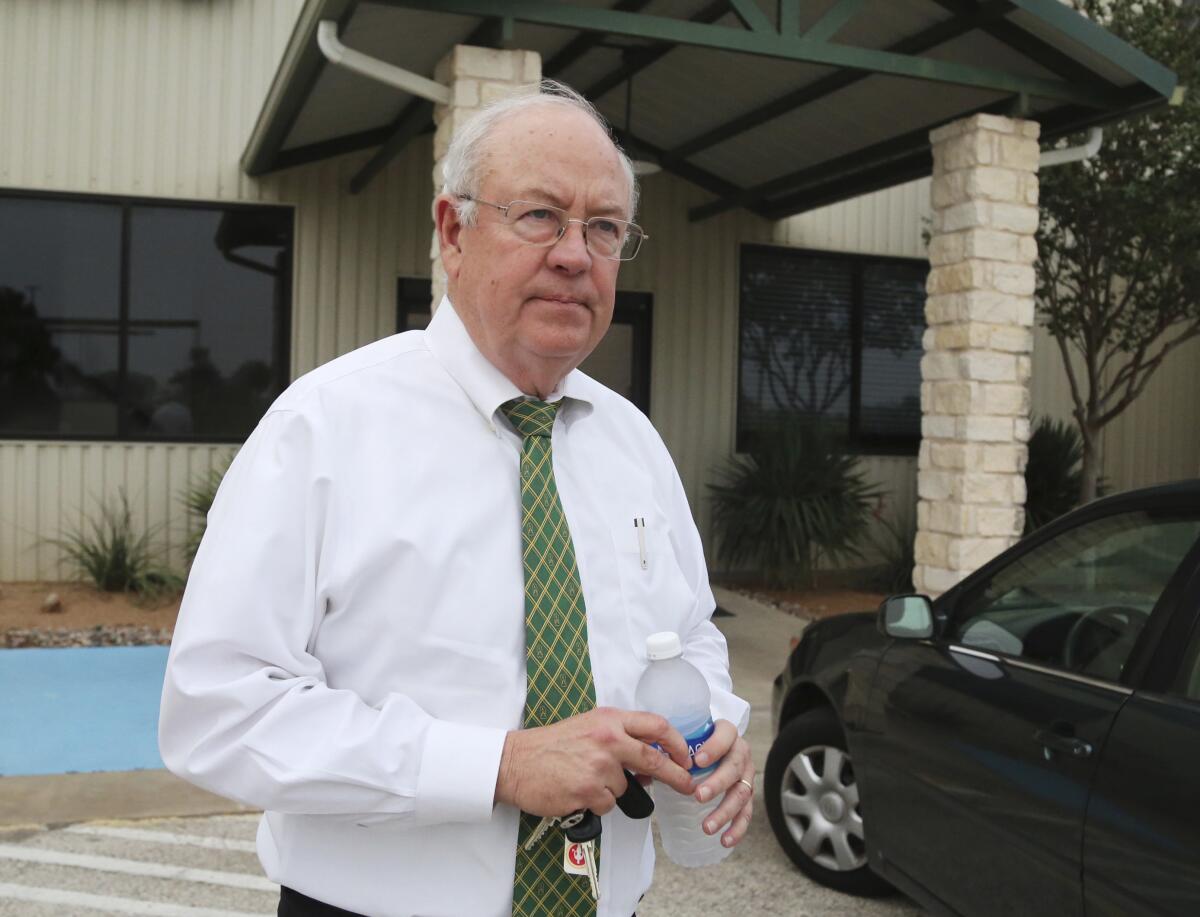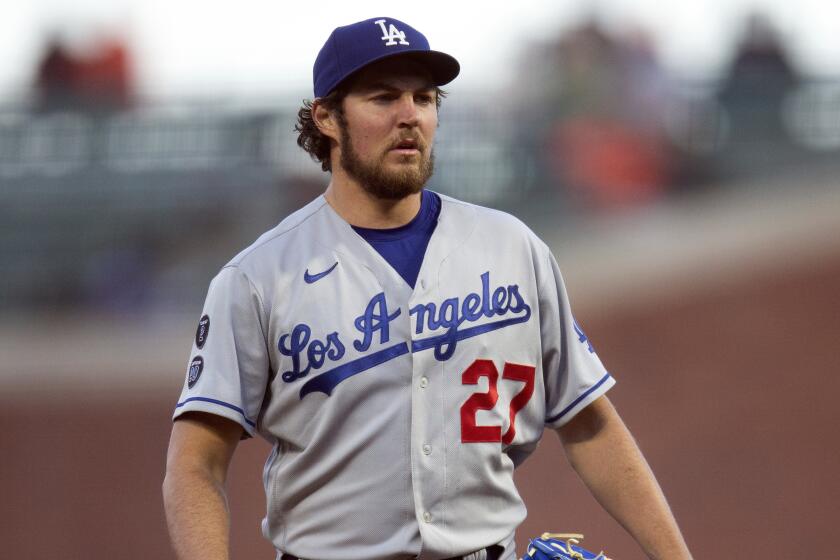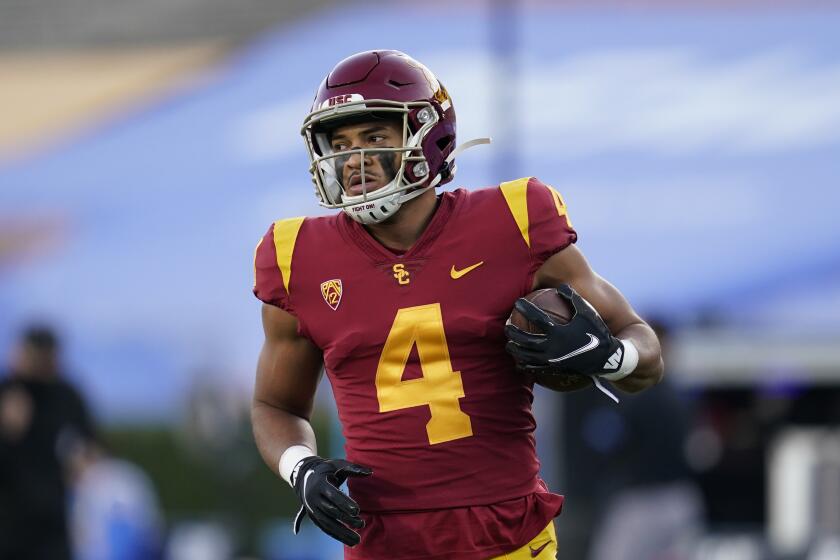Commentary: ‘Rape is not an NCAA violation’: How clearing Baylor puts women at risk

- Share via
On Wednesday, the NCAA’s Committee on Infractions (COI) announced it was not punishing Baylor University for failing “to report allegations of and address sexual and interpersonal violence committed on its campus” even though the school “admitted to moral and ethical failings in its handling of sexual violence.”
Baylor argued that “those failings, however egregious, did not constitute violations of NCAA legislation. Ultimately, and with tremendous reluctance,” the COI agreed. There was nothing to violate because the NCAA does not have any rules that address how athletic programs should handle reports of gendered violence, let alone how to discipline those programs, like Baylor, that failed victims of that violence.
The NCAA not punishing Baylor is the system working exactly as the NCAA has crafted it.
The system is bad.
Since 2013, I have been looking into how, if at all, the NCAA handles programs with poor track records around gendered violence. In 2016, I published a book titled “Unsportmanlike Conduct: College Football and the Politics of Rape.” In a chapter that specifically focuses on the NCAA, I wrote, “It is never the NCAA’s job to do anything about the problem of sexual violence committed by student-athletes — so says the NCAA.”
The COI report confirmed this. The report dropped almost six years to the day after Dan Solomon and I broke the story of a Baylor football player who had returned to the team even as he was on trial for sexual assault. The resulting media tidal wave prompted the school’s then-president, Ken Starr, to first ask for an internal investigation and then an external one.
Baylor hired the law firm Pepper Hamilton, which announced its findings in 2016. Specific failings in the athletic department and the football program were found, “including a failure to identify and respond to a pattern of sexual violence by a football player, to take action in response to reports of a sexual assault by multiple football players, and to take action in response to a report of dating violence.”
Dodgers pitcher Trevor Bauer is on paid administrative leave after being accused by a woman of sexual assault. Here’s our coverage.
The school terminated the head football coach, suspended the athletic director (who left shortly thereafter and is now at Liberty University) and demoted Starr (who also subsequently left). Baylor’s Board of Regents said that between 2011 and 2016, 19 football players were accused of sexual assault or domestic violence. Between 2011 and 2014, one lawsuit alleged, 31 football players were involved in 52 acts of rape, including five gang rapes. Last week’s COI report said that although the NCAA could not punish the school, “none of this excuses the failures of coaching and athletics staff to report allegations of sexual and interpersonal violence.”
If the NCAA could not punish Baylor, of all schools, for how it dealt with reports of gendered violence, then no school can be held accountable by the organization under current NCAA policy. Administrators at Louisiana State, itself a subject of an external report that cited systemic failure to address sexual violence in its athletic program and a school I recently investigated with a team at USA Today, probably breathed a sigh of relief.
I cannot stop thinking about the contradiction between the NCAA’s description of its mission and its abandonment of student-athletes who are harmed by other athletes. On its own website, the NCAA lists as one of its three priorities the “well-being” of collegiate athletes. It explains that “in 1906, the NCAA was founded to keep college athletes safe.” In that historical vein, the NCAA claims it is “working hard to protect them physically and mentally, on the field and off.” But when it comes to gendered violence, according to the COI’s report, the NCAA member institutions have “signaled that law enforcement, government and other regulatory bodies are the appropriate entities to investigate and hold institutions accountable.”
(There’s never a satisfactory answer why the organization has ceded this responsibility when it devotes so much time and resources to the monitoring and policing of the benefits collegiate athletes receive, no matter how trifling.)
USC receiver Bru McCoy, a Mater Dei alum, was arrested last month on suspicion of felony intimate partner violence with injury and will not participate in the start of training camp.
Most people are harmed by people they know, so it makes sense that in so many of these cases that I have investigated, the people reporting harm at the hands of athletes are other athletes. At Baylor, that included a soccer player, a volleyball player (whose case is specifically addressed in the COI report) and multiple equestrian athletes. At LSU, it was multiple tennis players and two people who worked in football recruitment. Seven women, three of them athletes, are currently suing the NCAA for failing to protect them from sexual violence committed by other athletes.
The NCAA should have a responsibility for their well being too. Mark Emmert, the president of the NCAA for the last decade, released a statement about the Baylor sanctions in which he said “the conduct by some former Baylor administrators, coaches, and student-athletes described in today’s Committee on Infractions decision is unacceptable and runs counter to the values of the NCAA.” Emmert called for “transformational change to create alignment between authority and responsibility to address the most critical issues in college sports.” He hopes the “newly formed Constitutional Committee,” which will soon begin work to draft proposals for changing rules enforcement and governance, can “effectuate this change.”
But Emmert ignored the fact the best way the NCAA can demonstrate its values is creating actual policy that legislates those values into practice. It has had the opportunity to do something on the policy level and chosen not to. Three years ago, The Commission to Combat Campus Sexual Violence, which the NCAA convened for two years, made a final recommendation to the NCAA’s Board of Governors in August 2018. Brenda Tracy, a survivor, founder of the anti-sexual violence organization Set The Expectation and a member of the Commission, told me that their recommendation was for the NCAA to adopt the Big Sky Conference’s Serious Misconduct Rule, which says that any current or prospective player who has been convicted, pleaded guilty or been found responsible by a school for serious misconduct is not eligible to be a part of an athletic department in the conference.
Ten former USC Song Girls described to The Times a toxic culture within the famed collegiate dance team that included longtime former coach Lori Nelson rebuking women publicly for their eating habits, personal appearance and sex lives.
Tracy says the Board of Directors for the NCAA did not take this up and decided instead to continue to monitor the issue. That same year, 2018, the NCAA cleared Michigan State of potential rules violations in the case of its onetime sports doctor, Larry Nassar, which involved the sexual abuse of hundreds of victims. Congress has also pushed the NCAA to do something, anything. Of Emmert, Tracy says, “You made it this way. You tied your own hands and you’re complaining that your hands are tied.”
In response to mounting pressure, the NCAA has created a Policy on Campus Sexual Violence that is focused primarily on educating athletic departments on the subject of gendered violence and, starting in 2022-2023, making a serious effort to know whether an incoming or current athlete in their department has been found responsible for misconduct (though there is no policy about what to do if they have been). The punishment for not doing either of these things is the NCAA prohibiting the school from “hosting any NCAA championship competitions for the next applicable academic year.”
That’s it.
As Tracy told me, “rape is not an NCAA violation,” still. Additionally, the Big Sky policy and others like it are primarily focused on the eligibility of individual players rather than addressing the kind of systemic failure the COI outlined at Baylor. After years of trying to work with the NCAA and make change, Tracy says the Baylor ruling felt like “a nail in the coffin.”
“It’s time,” she says, “to go over the NCAA’s head and ask the Department of Education to step in, because this is ridiculous. The NCAA is completely performative.”
It’s hard not to agree It often feels like the NCAA is trying to do the minimum. And in doing so, it continues to abandon athlete survivors. In the COI report about Baylor, the committee writes, “whether the NCAA infractions process has a role to play in addressing its member institutions’ responses to campus sexual violence is a philosophical decision that must be made by the Association’s membership. And if there is a role for the NCAA, the membership must determine the appropriate legislative vehicle to adjudicate such conduct.”
It is past time for the NCAA to seriously grapple with this philosophical decision. And if it does not, it’s worth asking: If the NCAA refuses to create policy that allows it to punish schools that fail to protect student athletes, then why does this organization exist at all?
Jessica Luther is an investigative journalist and author in Austin, Texas. She is co-author of “Loving Sports When They Don’t Love You Back” and co-host of the feminist sports podcast “Burn It All Down.”
More to Read
Go beyond the scoreboard
Get the latest on L.A.'s teams in the daily Sports Report newsletter.
You may occasionally receive promotional content from the Los Angeles Times.












